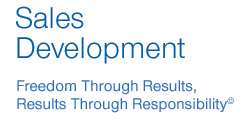Just about every day, I meet business owners, leaders and managers who refuse to accept mediocrity in their Operations, Product Quality, Distribution or Customer Service. Interestingly, those same leaders ARE willing and consistently accept mediocrity in their Sales Force, resulting in millions of dollars of lost revenue and profit. Sound familiar? While this assertion may seem incredible, it is unfortunately the rule and not the exception. The good news is that this phenomenon can be reversed.
If you would like to eliminate under-achievement from your Sales Force and transform it from Good to Great, all it takes is a DECISION and a COMMITMENT. The rest is formulaic.
So what is it about some salespeople, teams and companies that cause them to win while others fizzle? Here are the ten biggest differences between Sales Winners (over achievers) and Sales Losers (under achievers).
1. Choice - Over achievers consistently choose to do the things they don’t like to do. Weak players postpone or avoid them entirely.
2. Strategy - Winners develop specific strategies for both long-term and near-term success and for the accounts they seek to obtain or grow. Weaker salespeople spend little or no time strategizing. A solid strategy is required for effective execution. In the absence of a strategy, execution is a hope, not a reality.
3. UnConditional Commitment - Over achieving salespeople use Selling Time to Sell. Period. They have a Success Recipe and let nothing stand in the way of executing the required activities necessary to succeed. A winner who commits to making 25 calls in a given day will make them and not allow distractions and excuses like “I had to do more research”, “my computer locked up”, “my boss needed that report” or “the dog ate my homework” to prevent them from executing their committed activities.
4. Mental Toughness - When over-achievers lose a battle or experience a curve ball during a sales interview or cycle, they simply get back on their horse and strategize as to how their next call will achieve the desired result. When under-achievers lose a battle they often retreat, sulk, complain, give up, call someone who will be more accepting or kind, surf the internet, play solitaire or do nothing.
5. Expectations - Over achievers expect to win. Under achievers expect to just play. Expectations are even more important than goals. While goals provide long-term motivation, expectations set the bar for each and every interaction and meeting, as well as for the behaviors we might expect from ourselves, associates, prospects and Customers.
6. Reaction to Adversity – Adversity exists and no one is exempted. The only difference is in the reaction. Winners always see a challenge or opportunity where weak players see obstacles. Over achievers embrace challenges and even get excited about them. Under achievers become overwhelmed with challenges. They attempt to avoid obstacles, including “tough” conversations.
7. Emotional Control - When winners fail to get the desired result, they will not self-pity, lose control, find a comfort zone or become upset. They will simply stay in the moment and make their next move. When weaker players fail to get desired results they panic, become emotionally involved, become defensive and lose their objectivity.
8. Process - Over achievers “own” a process that they know is effective that keeps them effective, focused and efficient. They know how to maintain control of all selling interviews. They will execute it independent of the size or scope of the opportunity. Under achievers typically allow prospects to control the conversations and process and their results show it.
9. Self-Improvement – Winners consistently over achieve because they are relentless in their pursuit of improvement and refining their skills via reading, webinars, training, coaching and practice. Under achievers don’t necessarily see value in improving or practicing. Winners don’t just accumulate knowledge, they put it into action. Many weak players think they are “good enough”. Winners create a recurrent Development Plan and commit to continuous improvement.
10. Passion - Over achievers are passionate about their job and profession. They love what they do. Under achievers typically can’t wait to finish their day and go home.
If you would like to rate your Salespeople, be objective and use the following ratings.
1 - Poor
2 - Needs Significant Improvement
3 - Room for Improvement
4 - Needs Some Fine Tuning
5 - Congratulations, No Need for Improvement
It would be a good idea to ask each of your people to rate themselves as well, so you can compare results and develop a plan accordingly.
Compare your results according to this scale:
A Players: 40-50
B Players: 30-39
C Players: 20-29
Emergency: Under 20
Any surprises?
Any lessons learned?
Now that you know what you have, will you be making any changes?
Please share what you’ve learned
Continued Success!
Z3 Performance Development, Inc.
Austin, Texas 78750
www.zthree.com









